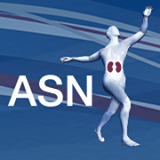
Intensive blood pressure lowering benefits patients with chronic kidney disease
American Society of Nephrology
Highlights
- In individuals with chronic kidney disease, targeting a systolic blood pressure to <120 mm Hg resulted in lower risks of cardiovascular events and premature death, compared with standard targeting to <140 mm Hg.
- There was a slightly faster decline in kidney function in the intensive group, but no increase in rates of kidney failure or serious adverse events.
Washington, DC (June 22, 2017) -- Results from a recent clinical trial indicate that intensive blood pressure lowering reduces chronic kidney disease (CKD) patients' risks of dying prematurely or developing cardiovascular disease. The findings appear in an upcoming issue of the Journal of the American Society of Nephrology (JASN).
The appropriate target for blood pressure in patients with CKD and hypertension has been unclear. To examine the issue, researchers analyzed information from the Systolic Blood Pressure Intervention Trial (SPRINT), sponsored by the National Institutes of Health. SPRINT, which enrolled individuals aged ?50 years with systolic blood pressure of ?130 mm Hg and at least one additional cardiovascular disease risk factor, compared targeting a systolic blood pressure to <120 mm Hg vs. <140 mm Hg for preventing cardiovascular complications and early death. The benefits of the lower target were apparent almost a year before the study was initially planned to end.
In their subgroup analyses, Alfred K. Cheung, MD (University of Utah) and his colleagues found that individuals who had CKD at the start of the study experienced similar benefits as those without CKD. After a median follow-up of 3.3 years for 1330 CKD patients in the intensive group and 1316 in the standard group, the composite cardiovascular outcome occurred in 112 and 131 participants, respectively, translating to a 19% reduction in risk for intensive-group participants. (The composite cardiovascular outcome included heart attack, acute coronary syndrome, acute decompensated heart failure, stroke, or heart-related death.) Also, there were 70 deaths from any cause in the intensive group compared with 95 in the standard group, for a 28% reduction in risk.
The team found that older participants aged ?75 years benefited at least as much as those who were younger within this CKD subgroup. There was a slightly faster decline in kidney function in the intensive group, but no increase in kidney events (such as kidney failure) or serious adverse events.
"In people with CKD, lowering systolic blood pressure beyond the conventional goal reduced the risks of heart disease and death, but slightly hastened the decline in kidney function that often accompanies aging," said Dr. Cheung. He noted that these findings come from the largest randomized trial to date on the effects of blood pressure in patients with CKD.
###
The Systolic Blood Pressure Intervention Trial is funded with federal funds from the National Institutes of Health (NIH), including the National Heart, Lung, and Blood Institute (NHLBI), the National Institute of Diabetes and Digestive and Kidney Diseases (NIDDK), the National Institute on Aging (NIA), and the National Institute of Neurological Disorders and Stroke (NINDS), under Contract Numbers HHSN268200900040C, HHSN268200900046C, HHSN268200900047C, HHSN268200900048C, HHSN268200900049C, and Inter-Agency Agreement Number A-HL-13-002-001.
Study co-authors include more than 30 investigators in the SPRINT Research Group. They reported the following disclosures: Jan Basile receives research support from Eli Lilly and is a consultant for Novartis and Medtronic, a contributor to Up-to-Date and in a speaker bureau of Amgen, Arbor, and Janssen. Alfred K. Cheung is a Consultant for Boehringer Ingelheim and a contributor to Up-to-Date.
William C. Cushman received an institutional grant from Eli Lilly & Co. and is an unpaid consultant of Takeda Pharmaceuticals. Barry I. Freedman receives research support from Novartis Pharmaceuticals and is a consultant for AstraZeneca Pharmaceuticals and Ionis Pharmaceuticals. Tom Greene is a consultant for Jansen Pharmaceuticals, Pfizer Inc. and Sanofi. Suzanne Oparil has received fees from Actelion Clinical Research, Inc., AstraZeneca, Boehringer Ingelheim, GlaxoSmithKline, Lilly, Lundbeck, Novo Nordisk, Inc, Onyx Pharma, Inc., research grants from AstraZeneca, Bayer Healthcare Pharmaceuticals, Inc., Merck and Co., and Novartis, all outside of this submitted work. Udayan Bhatt, Srinivasan Beddhu, Tara I. Chang, Glenn M. Chertow, Michel Chonchol, Timothy E. Craven, William Haley, Amret T. Hawfield, Joachim H. Ix, Karen C. Johnson, Lois A. Katz, Anthony A. Killeen, Paul L. Kimmel, Cora E. Lewis, Vasilios Papademetriou, Mahboob Rahman, David M. Reboussin, Ana C. Ricardo, Michael V. Rocco, Karen Servilla, Kaycee M. Sink, Barry Wall, Paul K. Whelton, Dawn Wolfgram, Jackson T. Wright and Jerry Yee have no competing financial interest.
The article, entitled "Effects of Intensive Blood Pressure Control
in Chronic Kidney Disease," will appear online at
http://jasn.
The content of this article does not reflect the views or opinions of The American Society of Nephrology (ASN). Responsibility for the information and views expressed therein lies entirely with the author(s). ASN does not offer medical advice. All content in ASN publications is for informational purposes only, and is not intended to cover all possible uses, directions, precautions, drug interactions, or adverse effects. This content should not be used during a medical emergency or for the diagnosis or treatment of any medical condition. Please consult your doctor or other qualified health care provider if you have any questions about a medical condition, or before taking any drug, changing your diet or commencing or discontinuing any course of treatment. Do not ignore or delay obtaining professional medical advice because of information accessed through ASN. Call 911 or your doctor for all medical emergencies.
Since 1966, ASN has been leading the fight to prevent, treat, and cure
kidney diseases throughout the world by educating health professionals
and scientists, advancing research and innovation, communicating new knowledge,
and advocating for the highest quality care for patients. ASN has nearly
17,000 members representing 112 countries. For more information, please visit
http://www.
